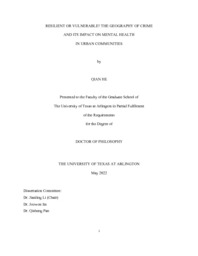
ATTENTION: The works hosted here are being migrated to a new repository that will consolidate resources, improve discoverability, and better show UTA's research impact on the global community. We will update authors as the migration progresses. Please see MavMatrix for more information.
Show simple item record
| dc.contributor.advisor | Li, Jianling | |
| dc.creator | He, Qian | |
| dc.date.accessioned | 2022-06-28T15:11:18Z | |
| dc.date.available | 2022-06-28T15:11:18Z | |
| dc.date.created | 2022-05 | |
| dc.date.issued | 2022-05-06 | |
| dc.date.submitted | May 2022 | |
| dc.identifier.uri | http://hdl.handle.net/10106/30385 | |
| dc.description.abstract | This dissertation examines the relationship between neighborhood characteristics, crime, and mental health, with an emphasis on the role of social disadvantage. Using 5-year panel data from Dallas- Fort Worth metroplex, Texas, and a Spatial Econometric research approach, the findings of this study provide suggestions for building safe and healthy communities. Building upon the interdisciplinary literature on urban planning, environmental criminology, and public health, this study first identifies the impact of environmental factors on property crime, then detects the moderating effects of neighborhood environment upon crime’s impact on mental health status.
This study finds that commercial and mixed land-use development, number of transit facilities, and alcohol-related establishments are positively associated with property crime rate while controlling for other factors and spatial spillover effects. Neighborhoods with a higher percentage of Black and African American people and a lower level of educational attainment tend to register a higher property crime rate. While crime, particularly violent crime, poses a significant threat to the mental health status, built environmental characteristics such as parks and recreational space, commercial and retail space, and employment density could help mitigate the negative impact on mental health. Additionally, Black or African American communities, Hispanic/Latinx communities, and people from renter households are more vulnerable to crime’s impact on mental health while controlling all other factors. This dissertation contributes to the understanding of how urban planners could address the challenge of crime and build healthy, resilient, and equitable neighborhoods. | |
| dc.format.mimetype | application/pdf | |
| dc.language.iso | en_US | |
| dc.subject | Urban planning | |
| dc.subject | Crime | |
| dc.subject | Mental health | |
| dc.subject | Collective efficacy | |
| dc.subject | Environmental equity | |
| dc.title | RESILIENT OR VULNERABLE? THE GEOGRAPHY OF CRIME AND ITS IMPACT ON MENTAL HEALTH IN URBAN COMMUNITIES | |
| dc.type | Thesis | |
| dc.degree.department | Urban and Public Affairs | |
| dc.degree.name | Doctor of Philosophy in Urban Planning and Public Policy | |
| dc.date.updated | 2022-06-28T15:11:18Z | |
| thesis.degree.department | Urban and Public Affairs | |
| thesis.degree.grantor | The University of Texas at Arlington | |
| thesis.degree.level | Doctoral | |
| thesis.degree.name | Doctor of Philosophy in Urban Planning and Public Policy | |
| dc.type.material | text | |
Files in this item
- Name:
- HE-DISSERTATION-2022.pdf
- Size:
- 43.06Mb
- Format:
- PDF
This item appears in the following Collection(s)
Show simple item record


